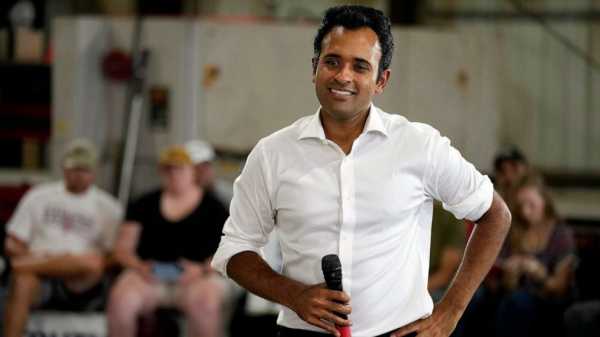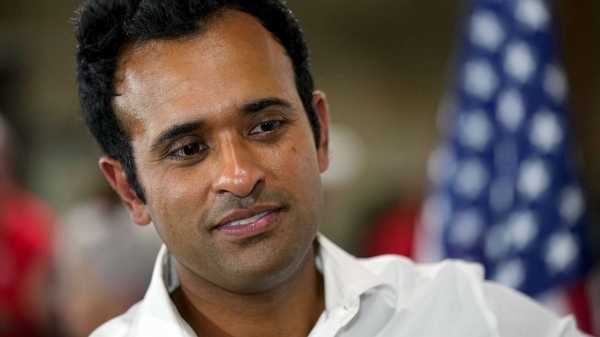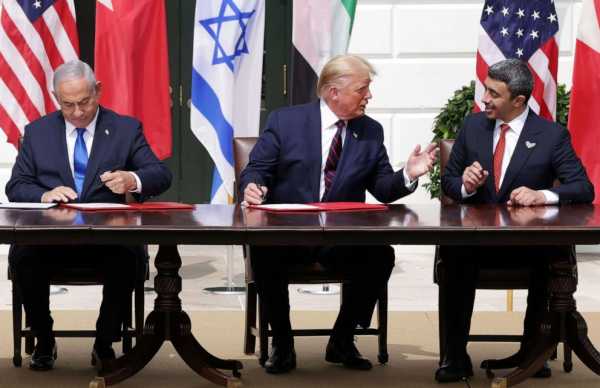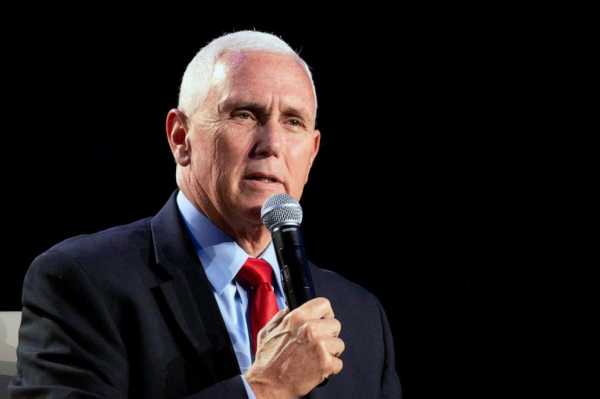Tech entrepreneur Vivek Ramaswamy has seen a boost in the polls, surpassing established politicians on a platform of revamping the federal government to root out “wokeness.” Now, though, he’s taken his anti-establishment message to foreign policy — and sparked backlash along the way that he’s likely to confront on stage at the Republican National Committee’s first primary debate Wednesday.
ABC News has reviewed some of Ramaswamy’s recent remarks to lay out how he plans to tackle foreign policy if elected president.

Republican presidential candidate Vivek Ramaswamy speaks during a campaign stop, Aug. 5, 2023, in Vail, Iowa.Charlie Neibergall/AP
MORE: 1st Republican presidential primary debate: Who’s in, who’s out
Ukraine and Russia
In recent days, Ramaswamy has doubled down on his view that Washington’s support for Ukraine is not in America’s best interest.
Ramaswamy said he would let Russian President Vladimir Putin keep parts of Ukraine under Moscow’s control in exchange for severed ties with China, telling ABC News that “the China-Russia military alliance is the single greatest military threat to the United States” and it’s imperative that it be dismantled — a take he views as a bipartisan, “pro-American policy.”
“I will ensure that I’m not a wartime president by actually de-escalating. Make sure that we’re in a position to pull apart that alliance, do a deal that yes, Vladimir Putin would do because he comes out of it rationally ahead of where he is now. But we come out even further ahead of where we are,” he said, breaking from the opinions of Senate Republicans such as Minority Leader Mitch McConnell.
Ramaswamy, who said he would prioritize a trip to Moscow in his first year in office, said he would make a “hard commitment” that NATO should never admit Ukraine, provided that Putin exit Russia’s military partnership with China.
Former New Jersey Gov. Chris Christie called Ramaswamy’s position on Ukraine unsubstantial.
“Vivek is Trump’s wingman. There’s no substance to what Vivek Ramaswamy is saying on this issue,” Christie told The Washington Post in August.
In a post on X (formerly Twitter), Ramaswamy responded, “Shamefully @GovChristie and the rest of the bipartisan Establishment are spouting off more nonsense about Ukraine,” adding that they are trying to bring the U.S. into “potential nuclear war” against Russia.

Republican presidential candidate Vivek Ramaswamy speaks during a campaign stop, Aug. 5, 2023, in Vail, Iowa.Charlie Neibergall/AP
Ramaswamy unveiled his foreign policy vision at the Nixon Presidential Library Thursday, promoting a vision with less involvement in foreign affairs that do not directly concern the U.S. Additionally, he said he would push other nations to be “the first protectors of their own national security” and to not “mess with” the U.S. in the western Hemisphere.
China and Taiwan
Ramaswamy also appeared to put a timeline on when the U.S. would no longer intervene in deterring a potential Chinese invasion of Taiwan, the self-governing island that bipartisan lawmakers have said the U.S. should defend if Beijing invades.
In his remarks at Erick Erickson’s “Gathering” in Atlanta, Georgia, last week, Ramaswamy said he would discourage China from invading Taiwan only until the U.S. achieves semiconductor independence. The U.S., through legislation such as the CHIPS Act, is working to bolster its chip-making technology as a national security measure.

The skyline of Taipei, Taiwan, is shown in this undated file photo.STOCK IMAGE/Getty Images
MORE: CHIPS Act will strengthen US national security by boosting access to semiconductors: Raimondo
“I think it is certainly the most important foreign policy objective for the next U.S. president: to declare economic independence from China, to deter China from going after Taiwan for so long as we rely on Taiwan for our semiconductors while avoiding war in the process,” he said.
Ramaswamy has also advocated for arming and training every Taiwanese household with AR-15s and suggested the National Rifle Association open a branch in the country to further deter any conflict. The NRA is currently only directly operational in the United States.
Should China decide to invade Taiwan, Ramaswamy has said he would not be willing to risk the lives of American troops to fight on Taiwan’s behalf.
Israel and the Middle East
Ramaswamy set a similar expiration date on financial support for Israel, saying that while he wanted an “Abraham Accords 2.0” that would create more normalization deals between Israel and other countries, financial aid for Israel shouldn’t be given indefinitely or regularly as it is now.
“I want to get Israel to the place where it is negotiated back into the infrastructure of the rest of the Middle East. We should not be worried about holding one nation or one region hostage over one particular question relating to Palestine,” Ramaswamy said in an interview with actor and activist Russell Brand in early August.
Ramaswamy’s discussion of a second round of Abraham Accords, a 2020 deal where Israel established normalization agreements with multiple Middle Eastern countries, notably echoes a key foreign policy achievement of Donald Trump’s administration with bipartisan support. The Biden administration has reportedly been exploring a similar normalization deal between Israel and Saudi Arabia, although officials have cautioned that any deal is a long way out.

Prime Minister of Israel Benjamin Netanyahu, President Donald Trump, and Foreign Affairs Minister of the United Arab Emirates Abdullah bin Zayed bin Sultan Al Nahyan participate in the signing ceremony of the Abraham Accords on the South Lawn of the White House on Sept. 15, 2020.Alex Wong/Getty Images, FILE
MORE: ‘Wanting to be famous’: How Vivek Ramaswamy sought podcast stardom prior to White House run
Ramaswamy has framed the “2.0” accords as allowing Israel “to stand on its own feet” and thus needing less foreign aid from the United States.
Ramaswamy’s proposal about aid to Israel has faced some pushback. Republican Jewish Coalition CEO Matt Brooks wrote in a letter to Ramaswamy that “now is not the time to end an aid program that provides so much benefit to our nation, strengthens our key strategic ally Israel, and contributes to the stability of the Middle East.”
Fellow GOP contender and former U.S. Ambassador to the U.N. Nikki Haley condemned Ramaswamy’s stance on ending “preferential treatment from the United States, even though our relationship with Israel has advanced American interests,” saying that “his foreign policies have a common theme: they make America less safe.”
Ramaswamy’s spokesperson Tricia McLaughlin responded to Haley’s comments saying they wish her well “on her future endeavors in corporate America’s boardrooms.”
9/11 and the U.S. government
Ramaswamy has expressed skepticism about the U.S. government’s 9/11 Commission and recounting of the terrorist attacks of Sept. 11, 2021. Though the candidate has said that this is not a core campaign issue for him, he wrote that the government may have been misleading about foreign involvement in 9/11 and told a reporter for the Atlantic that he wanted to find “the truth” about 9/11, echoing spurious claims about the day.
“I think it is legitimate to say how many police, how many federal agents, were on the planes that hit the Twin Towers,” Ramaswamy told the Atlantic in a discussion about Jan. 6, 2021.
Ramaswamy and his campaign later claimed his remarks were misconstrued and he was talking about federal agents on Jan. 6, 2021; in response to those claims, the Atlantic released a transcript and recording of his remarks about 9/11 that show Ramaswamy was quoted accurately and in the context of a 9/11 discussion.
MORE: Vivek Ramaswamy insists only 2 candidates matter in GOP primary race: Him and Trump
“We are grateful that the Atlantic released the audio after we repeatedly asked them to do so. The audio clearly demonstrates that Vivek was taken badly out of context and even this small snippet proves that,” McLaughlin said in a statement to ABC News. “We continue to encourage the Atlantic to release more of the recording, rather than their carefully selected snippet, so that full context and reality is exposed.”
Former Vice President Mike Pence, another candidate in the race, has called Ramaswamy’s skepticism of the 9/11 Commission offensive.

Presidential candidate and former Vice President Mike Pence speaks at The Gathering in Atlanta, Aug. 18, 2023.Ben Gray/AP, FILE
“I understand he was probably in grade school on 9/11 and I was on Capitol Hill,” Pence told the New Hampshire Union Leader in early August. “I think comments like that, conspiracy theories like that, dishonor the service and sacrifice of our armed forces who fought against our enemies determined to kill us.”
Ramaswamy, who turned 38 earlier this month, was in high school on 9/11.
Ramaswamy responded to Pence’s criticism in a post on X (formerly Twitter) defending his distrust and comments as part of his search for “the truth” against alleged government lies.
Sourse: abcnews.go.com